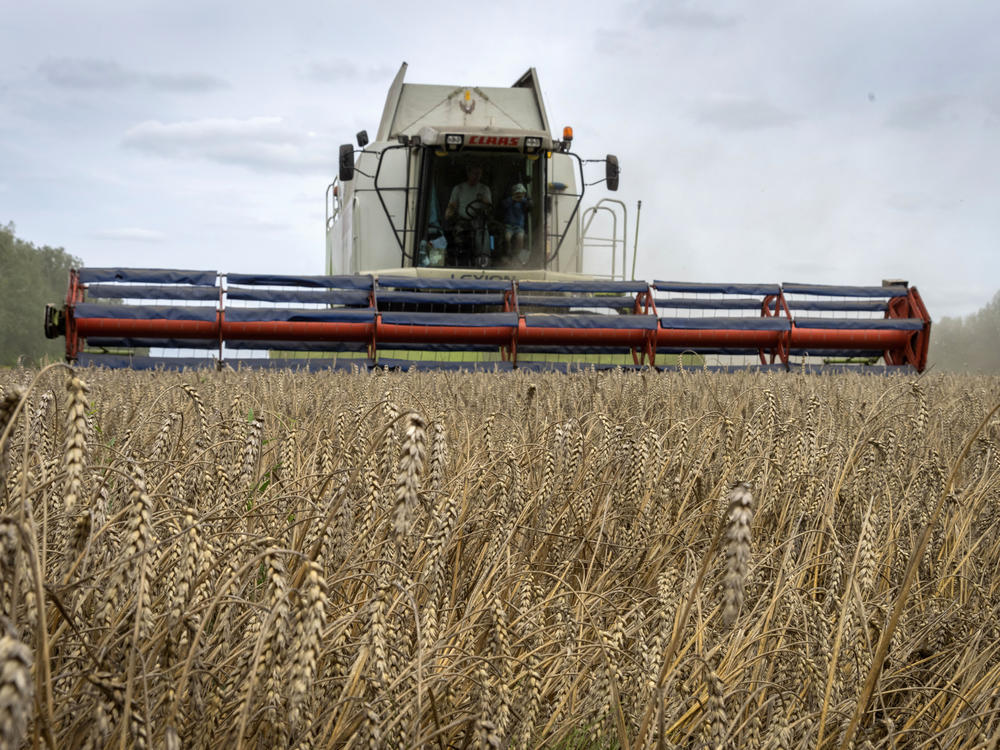Loading...
Section Branding
Header Content
Latest in Ukraine: The grain deal is out, cluster bombs and NATO expansion are in
Primary Content
Here's a look ahead and a roundup of key developments from the past week.
What to watch
Turkish officials are working to restore the Ukraine grain deal after Russia suspended its participation Monday. Turkey's government and the United Nations a year ago brokered the wartime deal that lets Ukraine export grain and other farm goods through the Black Sea. The deal's backers say halting it could drive up global food prices, as Ukraine has traditionally been a major grain exporter.
Observers are also watching for fallout or retaliation after an explosion on a key bridge linking the Russian mainland to the Crimea Peninsula early Monday. Russia blamed the blast on Ukraine, which has not claimed responsibility for it.
Also Monday, British Foreign Secretary James Cleverly is due to chair a meeting at the U.N. Security Council on Russia's invasion of Ukraine. The United Kingdom holds the council's rotating presidency.
On Tuesday, the U.N. General Assembly is expected to debate the situation of occupied territories of Ukraine.
What happened last week
NATO held an important summit in Lithuania with new member Finland at the table, and Ukraine waiting in the wings for a timeline to join. Ukrainian President Volodymyr Zelenskyy left the summit without a timeline but he did receive assurances for long-term backing from the United States and other allies.
Turkey dropped objections to Sweden's membership in NATO on the eve of the alliance's summit, paving the way for another NATO expansion in response to Russia's invasion of Ukraine.
The Biden administration said it wants to move forward with the sale of F-16s to Turkey after President Recep Tayyip Erdogan agreed to secure his country's approval of Sweden's NATO bid. But Congress would need to give the green light and some lawmakers have reservations about the sale.
Ukraine received cluster bombs from the U.S., the controversial weapons banned in more than 100 countries because of their danger to civilians. The Pentagon said the cluster munitions have a far lower rate of failure to explode than other cluster bombs, that would leave fewer unexploded rounds on the ground that could harm the population. Analysts and human rights workers say both Russia and Ukraine have used cluster munitions in the war. President Vladimir Putin claimed that Russia hasn't, but warned it has plenty of cluster bombs and would use them in "reciprocal action."
Belarus said Russia's Wagner Group mercenaries agreed to train Belarusian soldiers, in one of the latest developments since the mercenary group launched an attempted mutiny in Russia last month.
In-depth
She saved the diary of a Ukrainian writer killed by Russia. Then she was killed, too
Russia suspends Ukraine grain deal. Here's what it means for the rest of the world
How many Russians have died in Ukraine? New data estimates soldier casualties
Key takeaways from this week's NATO summit, according to the group's leader
Ukraine can't join NATO yet. But Biden says Zelenskyy is OK with that
Putin met Wagner leader Prigozhin days after failed uprising
Turkey's leader will work to approve Sweden's NATO bid ASAP, the alliance's head says
Perspective: The U.S. promised Ukraine cluster bombs. In Laos, they still kill civilians
On State of Ukraine podcast: A recent increase in cyber attacks coming from Russia
On Here & Now: 20 Days in Mariupol shows life and death under siege in Ukraine
Special report
Russia's war in Ukraine is changing the world: See our report on its ripple effects in all corners of the globe.
Earlier developments
You can read past recaps here. For context and more in-depth stories, you can find more of NPR's coverage here. Also, listen and subscribe to NPR's State of Ukraine podcast for updates throughout the day.
Copyright 2023 NPR. To see more, visit https://www.npr.org.

